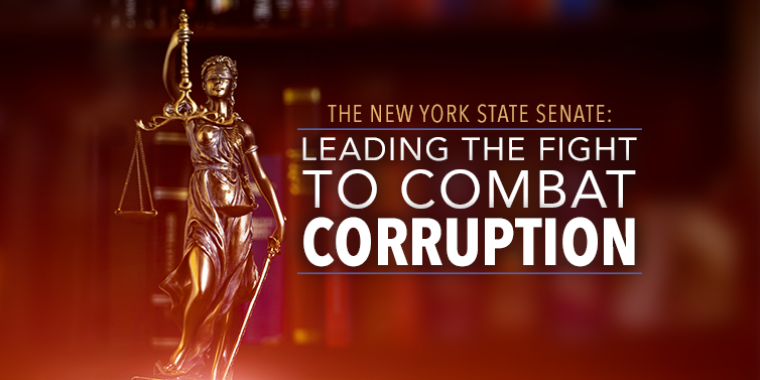
Senate Passes Ranzenhofer Bills as Part of Comprehensive Ethics Reforms Package
September 24, 2018

Albany, NY– The New York State Senate has approved two new bills– introduced by Senator Michael H. Ranzenhofer– as part of the most sweeping package of good government reforms proposed in years.
“From bid-rigging scandals to corruption trials, hard-working New Yorkers are fed up with the lack of ethics in state government, and the time is now for real reforms. I am pleased that these reforms are starting to advance through the Legislature,” said Ranzenhofer.
Preventing the Appearance of “Pay-to-Play”
S8409 limits political donations from parties applying for grants, licenses, or doing business with public entities to the public officials or candidates who would approve such grants, licenses, or contracts. Unfortunately, disclosures of significant donations by people or businesses who have received significant public contracts or licenses gives rise to public suspicion that there may be a relationship between the two occurrences, and thus to public cynicism and distrust of the process of how public bodies make decisions.
Prohibiting Certain Political Contributions by Government Appointees
S8404 prohibits appointees who are appointed by the Executive to make political contributions to the Executive or his or her political campaign. The appointees would be prohibited from making political contributions within a year of appointment, during their term, and for a year after the term ends. It also prohibits the appointee from soliciting contributions on behalf of the Executive or the Executive's campaign committee. This prohibition also applies to members in the appointee's household.
A February 2018 New York Times article profiled a current trend whereby Executive appointees have made political contributions to the Executive totaling nearly $900,000. An atmosphere where appointees operate under the practice of making routine political contributions to the individual appointing them to their positions leads hardworking citizens to believe that Albany is rife with a "pay-to-play" culture.
Ranzenhofer called for an end to these practices.
“Allowing these questionable practices to continue will only foster distrust and skepticism of the process in state government. Appointed officials of the Executive branch should not be permitted to make donations to the Governor's re-election campaign, and private companies should not be allowed to make campaign contributions to politicians while under consideration for state contracts. These reforms will help to end Albany's pay-to-play culture and restore the public's trust in their state government,” said Ranzenhofer.
The comprehensive legislative package incorporated additional measures to boost accountability, transparency, and prevent the misuse of taxpayer dollars. Bills passed by the Senate include:
• Developing a Searchable Subsidy Database: S6613B requires the creation of a searchable state subsidy and economic development benefits database that would help New Yorkers and policy makers monitor the use of taxpayer money used to grow our state's economy and create jobs. The database would include the name and location of the participant; the time span of received economic development benefits; the type of benefit received; the total number of employees at all sites of a project; the number of jobs a participant is obligated to retain and create during the project; the amount of economic development benefits received for the current reporting year; and a statement of compliance indicating if any other state agency has reduced, cancelled or recaptured economic development benefits from a participant.
• Creating the New York State Procurement Integrity Act: S3984A restores the State Comptroller's independent oversight of SUNY, CUNY, and OGS centralized contracts; expands the Comptroller's oversight of the procurement process to include contracts in excess of $1 million awarded by the SUNY Research Foundation; and prohibits state contracting through state-affiliated not-for-profit (NFP) entities unless explicitly authorized in law.
• Protecting State Investments When Deals Don’t Meet Expectations: S7697A ensures that the Public Authorities Control Broad members have sufficient information to make informed decisions prior to a vote approving funding and includes disclosure of a claw-back provisions for instances when a project job creation claim doesn’t come through, the state could recoup funding.
• Creating an Independent Budget Office: At least 23 other states– California, Texas, Florida, Connecticut and Vermont– have already established non-partisan budget offices to assist their legislatures. Accurate, up-to-date information is a key ingredient for prudent, timely budgetary and policy decisions. S2325 creates the New York State Independent Budget Office to provide objective, non-partisan analyses of state revenues, expenditures, and management practices to members of the Legislature for any legislation with fiscal impact or at the request of a leader or a committee.
• Reforming START-UP NY: S5985A restores and bolsters reporting requirements for START-UP NY by requiring the preparation of an annual report which would be provided to the Governor and the Legislature. The report would include, but is not limited to, the number of business applicants, number of businesses approved, benefits distributed and received, and the number of net new jobs created per business– including cumulative data that reflects the amount previously recorded and adjusted for net new jobs that have been lost.
The bills have been sent to the Assembly.
###
related legislation
Share this Article or Press Release
Newsroom
Go to NewsroomUpstate Deserves Its Fair Share For Infrastructure Improvements
November 18, 2015

New Bill Clarifies Fantasy Sports as Games of Skill
November 16, 2015
Liberty Pumps Tour
November 6, 2015

206,000 Pounds of Electronics Recycled at September Event
November 4, 2015
